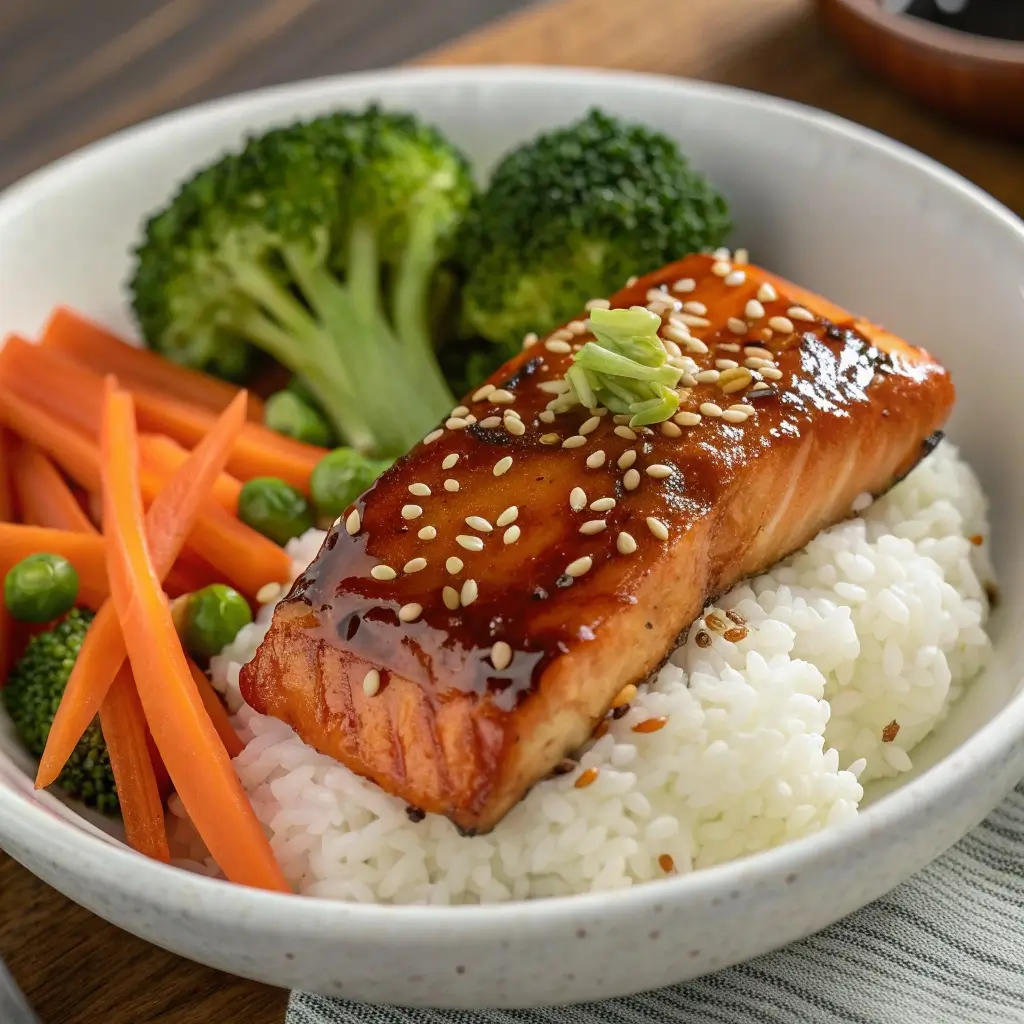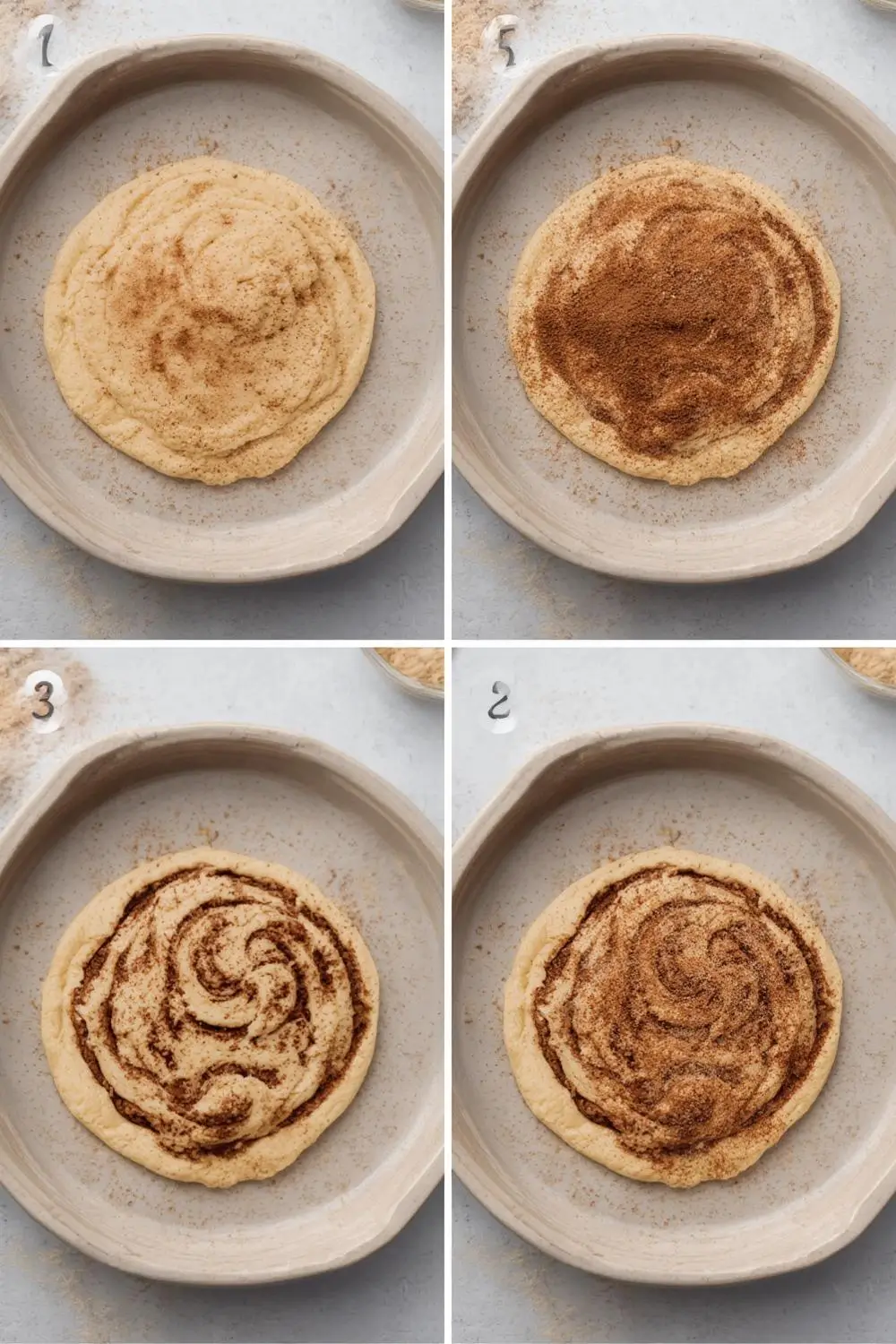Contents
- 1 Why You’ll Love This Recipe
- 2 Ingredients
- 3 Ingredient Notes & Substitutions
- 4 Tools You’ll Need
- 5 How to Make Teriyaki Salmon Rice Bowls
- 6 Tips for Best Results
- 7 Nutrition Information (Approx. per bowl)
- 8 Healthy Variations
- 9 Make-Ahead & Storage
- 10 Frequently Asked Questions (FAQs)
- 11 Delicious Pairing Ideas
- 12 Cultural Note: What Makes This Recipe “Teriyaki”?
- 13 Teriyaki Salmon Meal Prep Instructions
- 14 Storage & Reheating
- 15 Final Thoughts
Few dishes combine health, flavor, and simplicity like teriyaki salmon rice bowls. This vibrant, well-balanced dinner comes together in just 25 minutes, making it ideal for busy weeknights without sacrificing nutrition or taste. Tender, oven-roasted salmon fillets are brushed with a homemade teriyaki glaze—rich in umami, a little sweet, and completely free of alcohol. Served over a bed of fluffy rice and crisp, colorful vegetables, this bowl hits every mark: satisfying, wholesome, and utterly delicious.
In this comprehensive recipe article, we’ll break down everything from ingredient selection to sauce customization, cooking techniques, and smart substitutions. We’ll also answer your most pressing questions about storage, reheating, and nutrition. And yes—everything is alcohol-free, with no mirin, sake, or wine, making it suitable for halal, family-friendly, and wellness-conscious diets.
Why You’ll Love This Recipe
-
Quick and easy: From prep to plate in just 25 minutes
-
No alcohol: Made with an alcohol-free teriyaki sauce
-
Rich in protein & omega-3s: Salmon is both heart-healthy and satisfying
-
Customizable: Change up the veggies or use brown rice, quinoa, or cauliflower rice
-
Perfect for meal prep: Stores well and reheats beautifully
Ingredients
For the Salmon Bowls
-
4 salmon fillets (about 5–6 oz each), skin-on or skinless
-
½ teaspoon salt
-
½ teaspoon black pepper
-
1 tablespoon olive oil or avocado oil
-
2 cups cooked jasmine or white rice (or brown rice, quinoa)
-
1 cup broccoli florets, steamed or roasted
-
½ cup shredded carrots
-
½ cup thinly sliced cucumbers or edamame
-
1 tablespoon toasted sesame seeds
-
2 green onions, sliced thin (optional for garnish)
For the Homemade Teriyaki Sauce (Alcohol-Free)
-
¼ cup low-sodium soy sauce or tamari (for gluten-free)
-
3 tablespoons honey or maple syrup
-
2 tablespoons rice vinegar (unseasoned)
-
1 teaspoon toasted sesame oil
-
2 garlic cloves, minced
-
1 teaspoon fresh ginger, grated
-
1 tablespoon cornstarch
-
3 tablespoons cold water
Ingredient Notes & Substitutions
Salmon
-
Fresh vs. frozen: Either works well—just thaw frozen fillets overnight in the fridge.
-
Skin-on or skinless: Skin-on fillets crisp up nicely when pan-seared or baked, but skinless is easier to eat in bowls.
-
Other fish options: Try with trout, steelhead, or even firm tofu or tempeh for a vegetarian version.
Homemade Teriyaki Sauce
This sauce skips traditional mirin and sake, using rice vinegar and honey instead. It’s kid-friendly, alcohol-free, and has all the umami you’d expect from classic teriyaki.
-
Soy sauce: Use tamari or coconut aminos for gluten-free or low-sodium versions.
-
Sweetener: Honey gives a rich, sticky glaze. Maple syrup works great for a vegan option.
-
Cornstarch slurry: Thickens the sauce quickly without extra oil or butter.
Rice & Veggies
-
Rice options: White rice, brown rice, sushi rice, jasmine rice, or even cauliflower rice.
-
Vegetables: Use whatever is seasonal or on hand—bell peppers, snap peas, baby corn, spinach, zucchini, etc.
Tools You’ll Need
-
Baking sheet or oven-safe skillet
-
Saucepan or small pot (for teriyaki sauce)
-
Rice cooker or pot (for rice)
-
Knife and cutting board
-
Whisk or silicone spatula
-
Tongs or fish spatula
How to Make Teriyaki Salmon Rice Bowls
Step 1: Preheat & Prepare
-
Preheat your oven to 400°F (200°C).
-
Line a baking sheet with parchment paper or lightly oil it.
Step 2: Season the Salmon
-
Pat the salmon fillets dry with paper towels.
-
Brush each fillet with olive oil and sprinkle with salt and pepper.
-
Place on the prepared baking sheet, skin side down if using skin-on.
Step 3: Make the Alcohol-Free Teriyaki Sauce
-
In a small saucepan, combine soy sauce, honey (or maple syrup), rice vinegar, garlic, ginger, and sesame oil.
-
Bring to a gentle simmer over medium heat.
-
In a small bowl, whisk cornstarch with cold water until smooth.
-
Slowly add the cornstarch slurry to the simmering sauce while stirring.
-
Cook for 1–2 minutes, until the sauce thickens to a glaze-like consistency. Remove from heat.
Step 4: Glaze the Salmon
-
Spoon or brush a generous layer of teriyaki sauce over each salmon fillet.
-
Bake for 10–12 minutes, depending on the thickness of your fillets.
-
Optionally, broil for 1–2 minutes at the end to slightly caramelize the glaze.
Step 5: Assemble the Bowls
-
Divide cooked rice among 4 bowls.
-
Top each with a teriyaki-glazed salmon fillet.
-
Add steamed broccoli, carrots, and cucumbers.
-
Drizzle with extra teriyaki sauce if desired.
-
Sprinkle sesame seeds and green onions over the top.
Tips for Best Results
Cooking Salmon Perfectly
-
Don’t overcook: Salmon is done when it flakes easily with a fork and has an internal temperature of 125–130°F.
-
Use a fish spatula for easy removal without breaking the fillet.
-
You can also pan-sear salmon over medium heat for 3–4 minutes per side and brush with teriyaki at the end.
Teriyaki Sauce Tips
-
Stir constantly while thickening to prevent clumping.
-
Make a double batch and refrigerate extra for up to 1 week—it’s great on chicken, tofu, or veggies.
-
Add chili flakes or sriracha for a spicy twist.
Make It Meal Prep-Friendly
-
Store each component separately and assemble just before serving.
-
Keep the sauce in a small container to drizzle fresh.
-
Lasts 3–4 days in the fridge when stored properly.
Nutrition Information (Approx. per bowl)
-
Calories: 470–550 (depending on rice and sauce portions)
-
Protein: 35g
-
Carbs: 35–45g
-
Fat: 20g (mostly healthy fats from salmon)
-
Fiber: 4–6g
-
Sugar: 8–10g (from natural sweetener in sauce)
Healthy Variations
Lower Carb
-
Use cauliflower rice or serve over shredded cabbage.
-
Reduce or omit honey and thicken with just soy sauce and vinegar.
Dairy-Free & Gluten-Free
-
Naturally dairy-free
-
Use tamari or coconut aminos for gluten-free sauce
Vegan or Vegetarian
-
Swap salmon with grilled tofu, tempeh, or mushrooms
-
Use maple syrup and vegan Worcestershire if desired
Make-Ahead & Storage
-
Make-ahead: Cook rice, chop veggies, and prepare sauce ahead of time. Cook salmon fresh for best texture.
-
Refrigerate: Store all ingredients in separate containers for 3–4 days.
-
Reheat: Warm salmon and rice gently in the microwave or on the stovetop.
-
Freezer-friendly: Cooked salmon and rice freeze well. Freeze individually, thaw overnight, and reheat with fresh sauce.
Frequently Asked Questions (FAQs)
Can I make teriyaki sauce without any alcohol?
Yes! This recipe is 100% alcohol-free and does not use mirin, sake, or any wine-based ingredients. It uses rice vinegar and honey for sweetness and tang.
Can I grill the salmon instead?
Absolutely. Grilled salmon adds a smoky depth to the dish. Brush the fillets with teriyaki sauce before and during grilling. Grill over medium heat for 4–5 minutes per side, or until the salmon is flaky and cooked through.
What’s the best substitute for rice vinegar?
If you don’t have rice vinegar, you can substitute it with apple cider vinegar or white vinegar with a pinch of sugar. These help mimic the mild acidity of rice vinegar without adding harshness.
Is this recipe spicy?
The base recipe is not spicy at all, making it perfect for kids or sensitive palates. If you want heat, stir in some sriracha, red pepper flakes, or a bit of gochujang into the sauce for a kick.
Can I use store-bought teriyaki sauce?
Yes, but most store-bought teriyaki sauces contain mirin or sake, so be sure to check labels if you’re avoiding alcohol. Homemade sauce is not only healthier but customizable in sweetness and saltiness.
How do I know when salmon is fully cooked?
Salmon is done when it flakes easily with a fork and the center is opaque. For precision, use a meat thermometer: the internal temperature should reach 125–130°F (52–54°C) for moist, tender results.
Can I make this recipe for a crowd?
Definitely. Simply double or triple the recipe ingredients and bake the salmon fillets on a large sheet pan. You can keep the rice and veggies warm in separate covered dishes until ready to assemble.
What other vegetables go well in these bowls?
This dish is super versatile! Try these options:
-
Roasted sweet potatoes
-
Blanched snow peas or sugar snap peas
-
Steamed spinach or baby bok choy
-
Pickled radishes or kimchi (for a fusion twist)
-
Sliced avocado or mango (for sweetness)
Delicious Pairing Ideas
These teriyaki salmon bowls are great on their own, but here are some sides and drinks that pair beautifully:
-
Side Dishes:
-
Miso soup (alcohol-free broth)
-
Steamed dumplings (vegetable or chicken)
-
Sesame cucumber salad
-
-
Drinks:
-
Iced green tea with lemon
-
Sparkling water with cucumber and mint
-
Homemade ginger lemonade
-
-
Dessert:
-
Fresh fruit salad with lime and honey
-
Mango sticky rice
-
Matcha-flavored mochi or ice cream (dairy-free if preferred)
-
Cultural Note: What Makes This Recipe “Teriyaki”?
Teriyaki is a Japanese cooking technique where food is grilled or broiled with a glaze made of soy sauce, mirin, and sugar. While this version omits mirin (a sweet rice wine), it retains the balance of umami, sweetness, and shine that defines traditional teriyaki.
Our alcohol-free sauce respects the spirit of teriyaki while being more accessible and inclusive to various dietary and cultural needs.
Teriyaki Salmon Meal Prep Instructions
These bowls make fantastic make-ahead lunches or dinners. Here’s how to prep efficiently:
Prep Day:
-
Cook the rice and portion it into containers.
-
Steam or roast your vegetables and let them cool.
-
Make the teriyaki sauce and store it in a jar.
-
Cook the salmon, let cool, and refrigerate separately.
Assembly:
When ready to eat, reheat rice and salmon (microwave or stovetop), then top with sauce and veggies. Add fresh garnishes like cucumbers, green onions, or sesame seeds right before serving.
Storage & Reheating
-
Fridge: Store in airtight containers for up to 4 days.
-
Freezer: Cooked salmon and rice can be frozen (store separately) for up to 2 months.
-
Reheating tips:
-
Microwave on medium heat, covered with a damp paper towel.
-
Or gently reheat on the stovetop with a splash of water or broth to prevent drying out.
-
Final Thoughts
If you’re looking for a healthy, flavorful, and alcohol-free dinner option that’s just as satisfying as takeout (but better for you), these Teriyaki Salmon Rice Bowls are your new go-to. With a glossy homemade teriyaki glaze, perfectly cooked salmon, fresh vegetables, and fluffy rice, this dish checks every box: simple, nutrient-packed, and irresistibly good.
Whether you’re meal prepping for the week, feeding picky eaters, or just craving something nourishing and delicious, this recipe brings the restaurant experience home—without the fuss and without compromising on your dietary values.





